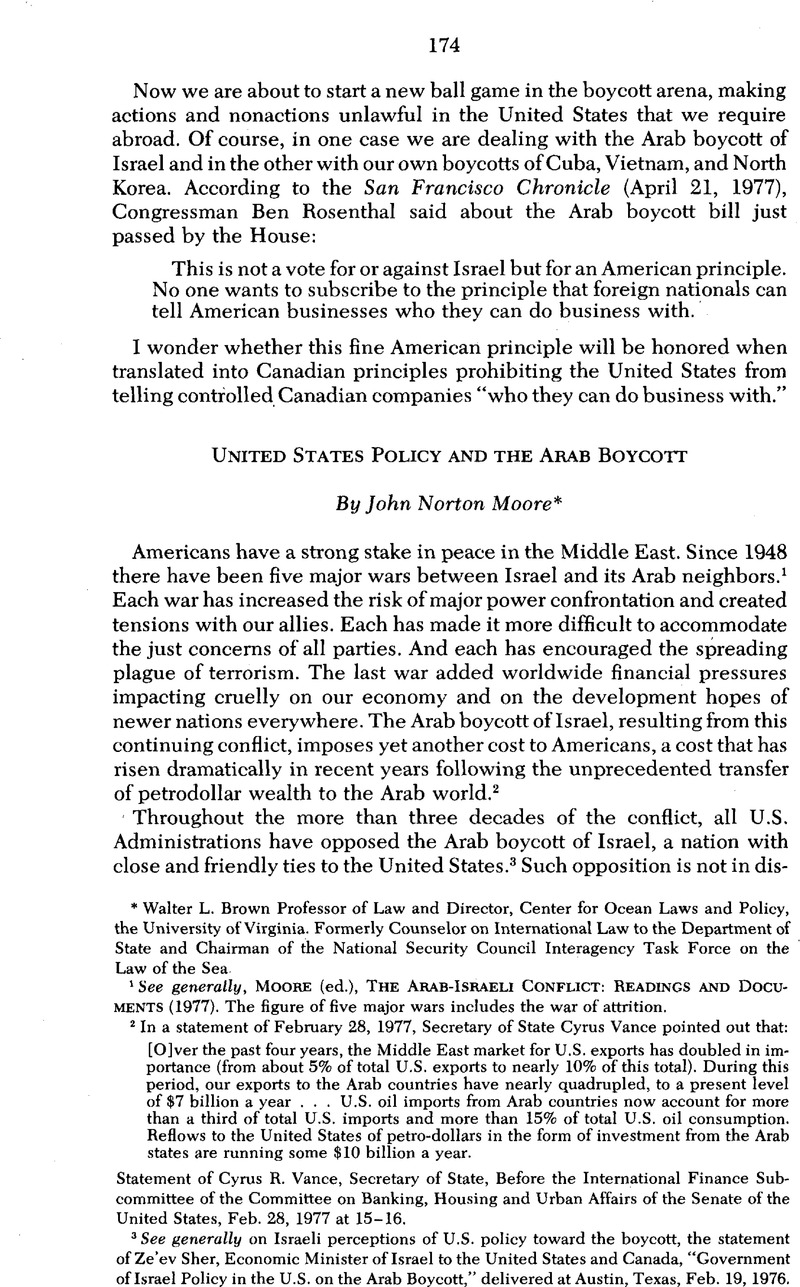No CrossRef data available.
Published online by Cambridge University Press: 28 February 2017

1 See generally, Moore (ed.), The Arab-Israeli Conflict: Readings and Documents (1977). The figure of five major wars includes the war of attrition.
2 In a statement of February 28, 1977, Secretary of State Cyrus Vance pointed out that:
[O]ver the past four years, the Middle East market for U.S. exports has doubled in importance (from about 5% of total U.S. exports to nearly 10% of this total). During this period, our exports to the Arab countries have nearly quadrupled, to a present level of $7 billion a year … U.S. oil imports from Arab countries now account for more than a third of total U.S. imports and more than 15% of total U.S. oil consumption. Reflows to the United States of petro-dollars in the form of investment from the Arab states are running some $10 billion a year.
Statement of Cyrus R. Vance, Secretary of State, Before the International Finance Subcommittee of the Committee on Banking, Housing and Urban Affairs of the Senate of the United States, Feb. 28, 1977 at 15-16.
3 See generally on Israeli perceptions of U.S. policy toward the boycott, the statement of Ze'ev Sher, Economic Minister of Israel to the United States and Canada, “Government of Israel Policy in the U.S. on the Arab Boycott,” delivered at Austin, Texas, Feb. 19, 1976.
4 See the statement of Secretary of State Cyrus R. Vance, supra note 2, at 10-15.
5 For a general discussion of both United States and Arab boycott practices, see N. Weick, The Arab Boycott of Israel, 55 Foreign Affairs 472 (1977) and H. Steiner, International Boycotts and Domestic Order: American Involvement in the Arab-Israeli Conflict, 54 Texas L. Rev. 1355 (1976).
6 One of the best descriptions of U.S. policy toward the boycott is contained in H. Steiner, supra note 5, at 1374-84.
7 Section 3(5) of the Export Administration Act of 1969.
8 See the Text of Stipulation, Proposed Final Judgment, and Competitive Impact Statement in United States v. Bechtel Corp., Cir. No. C-76-99 (BGH) (N.D. Cal, filed Jan. 10, 1977). For a general discussion of the antitrust issues, see L. Schwartz, The Arab Boycott and American Responses: Antitrust Law or Executive Discretion, 45 Texas L. Rev. 1260 (1976); L. Kestenbaum, The Antitrust Challenge to the Arab Boycott: Per Se Theory, Middle East Politics, and United States v. Bechtel Corporation, id. 1411.
9 §§ 1001-64 of the Tax Reform Act of 1976. Pub. L. No. 94-455, §§ 1061-64, [1976] U.S. Code Cong. & Ad. News 1649-53 (to be codified in I.R.C. §§ 908, 952(a), 996(b)(1), 999).
10 See Statement of Secretary of State Cyrus R. Vance, supra note 2, at 7-8.
11 See H.R. 5840, “Extension of the Export Administration Act of 1969.” The bill was passed on April 20, 1977 by a vote of 364 to 43. See also Subcomm. on Oversight and Investigation of the House Comm. on Interstate and Foreign Commerce, The Arab Boycott and American Law, H.R. Rep., 94th Cong., 2d Sess. (1976).
12 See S.69, “A Bill to Amend and Extend the Export Administration Act” (Jan. 10, 1976). See also Senate Comm. on Banking, Housing and Urban Affairs, Report to Accompany S. 953. S. Rep. No. 94-632, 94th Cong., 2d Sess. (1976). [The amendments to the Export Administration Act were approved on June 22, 1977. See supra p. 170, n. 1.]
13 See Steiner, supra note 5, at 1367, 1369-70.
14 Id. at 1363.
15 This point is stressed by Secretary of State Vance in his February 28, 1977 statement on boycott policy. See Statement of Secretary of State Cyrus R. Vance, supra note 2, at 16.
16 For a statement generally recommending against additional legislative measures to deal with the Arab boycott, see C. Bassiouni, “Analysis of New and Proposed U.S. Laws on the Arab Boycott,” (paper delivered at a panel of the International Trade Club of Chicago on Feb. 18, 1977).
17 This paper has not sought to examine the lawfulness of the Arab boycott under international law. For a general introduction to the debate, see J. Paust & A. Blaustein, The Arab Oil Weapon —A Threat to International Peace, 68 AJIL 410 (1974), reprinted in Moore (ed) supra note 1, at 391, and I. Shihata, Destination Embargo of Arab Oil: Its Legality Under International Law, 68 AJIL 591 (1974), reprinted in Moore, (ed) supra note 1, at 421. See also the useful Symposium in 12 Texas Int'l L.J. 1-74 (1977). In addition to this general debate it is also useful in appraising the lawfulness of the boycott to consider the question of whether Arab League collective action encouraging the boycott is permissible under Article 53 of the UN Charter or whether it amounts to “enforcement action” that is impermissible unless taken with Security Council authorization. For some of the precedents, see J. N. Moore, Law and the Indo-China War 296-349 (1972).
With respect to possible U.S. legal obligations in responding to the boycott, Israel has raised the question of whether U.S. acquiescence in the boycott would violate the U.S.-Israel Treaty of Friendship, Commerce and Navigation. See the Statement of Ze'ev Sher, supra note 3, at 3-4.